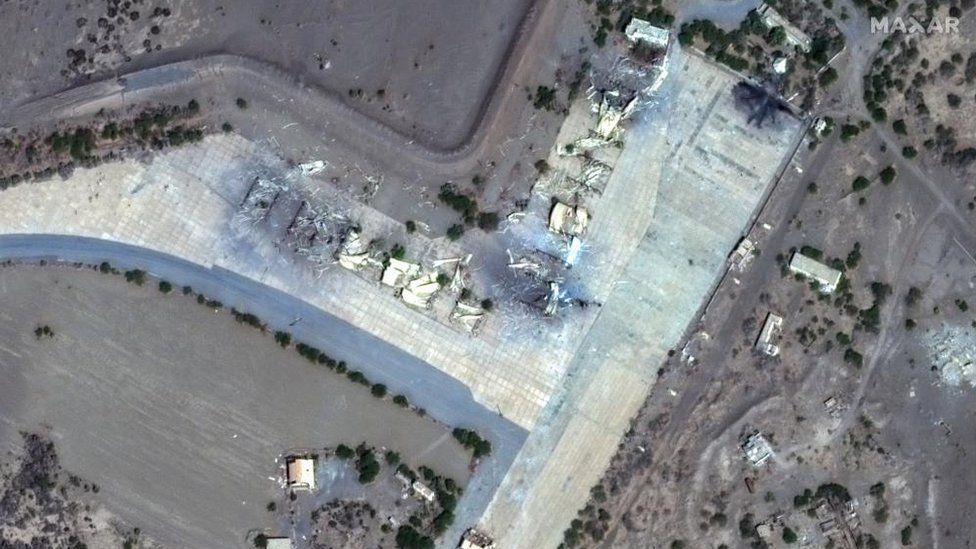ARTICLE AD BOX
 Image source, Maxar
Image source, Maxar
Satellite photos released on Friday purport to show damage in Hudaydah after US-UK strikes on Friday
The US says it carried out a fresh attack against a Houthi target in Yemen on Saturday - its second such strike on the group in two days.
The operation was described by the US as a "follow-on action" targeting a Houthi radar site.
The Houthis vowed a "strong and effective response" to the strikes, adding that there were no injuries.
The strikes come after weeks of attacks by Houthis on shipping vessels in the Red Sea.
Joint UK-US airstrikes targeted nearly 30 Houthi positions in the early hours of Friday with the support of Western allies including Australia and Canada.
A day later, the US Central Command said it carried out its latest strike on a Houthi radar site in Yemen using Tomahawk land attack cruise missiles.
It described the strike as a "follow-on action on a specific military target" which took place in Yemen at 03:45 local time (00:45 GMT).
The strikes were designed to "degrade the Houthi's ability to attack maritime vessels", it added.
Houthi spokesman Nasruldeen Amer told Al Jazeera in quotes cited by Reuters that the "new strike will have a firm, strong and effective response" and added that it had caused no injuries nor "material damages".
Another Houthi spokesman Mohammed Abdulsalam told Reuters the strikes had no significant impact on the group's ability to prevent what it calls Israel-affiliated vessels from passing through the Red Sea and the Arabian Sea.
Since 19 November, according to the US Central Command, the group has "attempted to attack and harass vessels in the Red Sea and the gulf of Aden 28 times".
More on the US-UK strikes in Yemen
Thousands of people gathered in Saana on Friday after the first US-UK strikes, chanting pro-Palestinian and anti-US slogans.
Tensions have heightened over the possibility that strikes in Yemen could further destabilise the Middle East.
However both the UK and US insist their actions are to protect shipping routes and are not related to the Israel-Gaza conflict.
According to the White House, about 15% of global seaborne trade passes through the Red Sea. This includes 8% of global grain, 12% of seaborne oil and 8% of the world's liquified natural gas.
The threat posed by the Houthis has led to some major shipping companies ceasing operations in the region, while insurance costs have risen 10 times since early December.
Image source, Getty Images
Image caption,Houthi supporters demonstrated in the capital Sanaa on Friday after the first US-UK air strikes against the group
London and Washington have backed Israel following the 7 October attacks by Hamas in which about 1,300 people were killed and some 240 were taken hostage.
Israel's retaliatory military campaign of air strikes and ground operations against Hamas in Gaza have killed 23,843 Palestinians so far, according to the Hamas-run health ministry on Saturday, with thousands more believed dead under rubble.
In response to the war, the Houthis declared support for Hamas and began attacking ships they said were destined for Israel or had Israeli links.
The Houthis are an armed group from a sub-sect of Yemen's Shia Muslim minority, the Zaidis. They take their name from the movement's founder, Hussein al-Houthi.
The official government of Yemen is the Presidential Leadership Council, to which President Abdrabbuh Mansour Hadi transferred his powers in April 2022. It is based in the Saudi capital Riyadh, after Mr Hadi fled there in 2015.
Most of the Yemeni population lives in areas under Houthi control. As well as Sanaa and the north of Yemen, the Houthis control the Red Sea coastline.

 1 year ago
60
1 year ago
60








 English (US) ·
English (US) ·